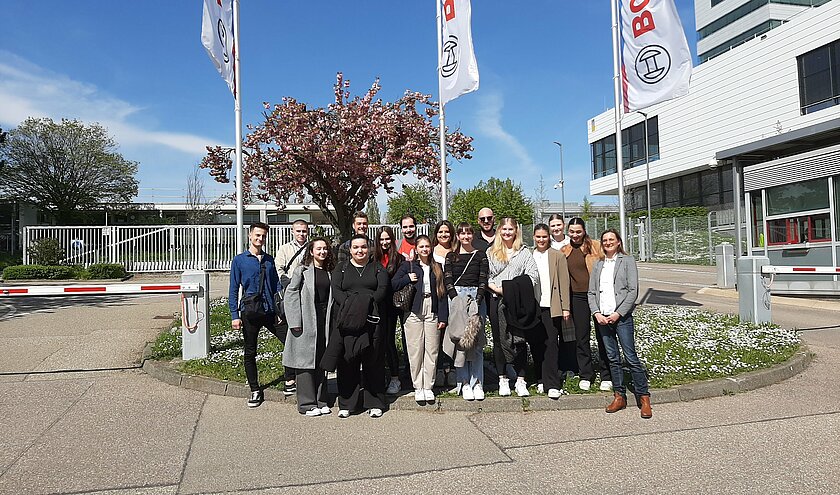Business Psychology (BSc)
What makes people tick? What about groups? Crowds? Markets?
The degree programme will train you for a career in the following fields:
- marketing and consumer behaviour
- human resources and organisation
- communication, collaboration & crisis management
The theoretical training in the Business Psychology programme is based on 3 pillars:
- business
- psychology and
- quantitative & qualitative methods
The bilingual theoretical curriculum is taught by professors and lecturers who draw on their own practical experience. The course work is supplemented by an internship semester and a final thesis with practical relevance. The thesis is generally supervised in cooperation with companies, organisations or public authorities.
Admission and application
Admission requirements
- A minimum of an entrance qualification for a university of applied sciences (valid in Bavaria)
- For international applicants: German B2
- The degree programme has (local) admission restrictions, under certain circumstances, this may result in an Numerus Clausus
Application period
Winter semester: 02.05. – 15.07.
Summer semester: 01.12. – 15.01.
About the programme
Content of the degree programme
The programme is divided into four content areas:
Psychology(PSY)
- Basics of Psychology
- Differential and Personality Psychology
- Personality Diagnostics
- Motivational and Learning Theory
- Social Psychology
- Market and Advertising Psychology
Business Studies (BWL)
- Basics of Business Studies
- Economics
- Investment and Financial Planning
- Accounting
- Human Resources Management
- Organisation Theory
- Marketing and Business Management
Methodology (METH)
- Mathematics
- Statistics
- Basics of Scientific Practice
- Test Theory as well as Computer Science and Programming for the Analysis of Large Amounts of Data
Structure of the degree programme
1st – 4th Semester
Theoretical basics in 3 pillars
- Business Studies (BS)
- Methodology Toolkit (METH)
- Psychology (PSY)
5th Semester
- Practical Training in Germany or Abroad
- Exploring the Job Market
6th Semester
Choice of 3 specialisations (SP) for an individual profile. The following specialisations are available:
- Consumer psychology
- Communication psychology and conflict management
- Consulting
- Entrepreneurship
- Marketing, Branding and Strategy
- Strategic Market and Sales Management
- Strategic Market Intelligence
- International Management and Leadership
- Organizational Development
- Human Resources Management and Labor Law
The theory for the 1st and 2nd specialisations is covered during the 6th semester.
7th Semester
- Theory for Third Specialisation
- Bachelor’s Thesis
Special features
Specialisations and profiles
Degree Specialisation
Degree specialisation allows you to choose three from a wide range of available specialisations in order to customise your degree with a profile that suits your aspired career choice.
The following specialisations are available:
- Consumer psychology
- Communication psychology and conflict management
- Consulting
- Entrepreneurship
- Marketing, Branding and Strategy
- Strategic Market and Sales Management
- Strategic Market Intelligence
- International Management and Leadership
- Organizational Development
- Human Resources Management and Labor Law
Career perspectives
Possible career fields:
Marketing, market research and sales
In this area, it’s all about finding of what makes people tick and what makes markets tick.
How do customers perceive products and services and how can this be improved? How do customers arrive at decisions that lead them to purchase a product or service? What are the different customer segments, how do they differ and how should they be addressed? How can customer loyalty be improved? How is the brand perceived and how can it be developed? What is the best structure for the sales department?
What customer data is necessary and what is the best way to collect and analyse it?
Organisational development, change management & human resources
Here, the focus is on a number of questions that play a central role in a company’s success, such as:
What forms of organisation are suitable for which operational processes? How can organisations be continuously developed and processes improved? How can changes within a company be accompanied by effective change management – i.e. how can the people who are affected by the change be included in the change process? And how can constructive cooperation between employee representatives and works councils be ensured?
In the field of human resources, the important questions include: What is the best way to select future employees? What is the best way to evaluate employees and what criteria should be used as a basis for promotion? Which structures for compensation (salary, bonus) make the most sense?
Communication, negotiation and collaboration
Life is not always a picnic. And people don’t always focus on the real issue in negotiations and discussions.
Especially when conducting negotiations (but also in daily cooperation with colleagues), it is important to have an answer to the following questions: What does my counterpart want? What fears could he/she possibly have, and how should I approach these fears? What individual patterns of motivation drive my counterpart? How can I use these patterns to create a win-win situation? When is it useful to erect threatening backdrops, and when is de-escalation the better strategy?
The topic of crisis management is also relevant here: What is the best way to keep a crisis under control? Who is indispensible? Who can help? Who is more likely to cause disruptions? What should I communicate to whom in a crisis situation, and when?
Internships and stays abroad
The study programm Business Psychology at the HNU is very practice-oriented. The content of the course is taught by professors and lecturers with practical experience. The 5th semester is a practical semester in which you can already make initial contacts for your career start.
Stays abroad are not compulsory, but are recommended and supported by the faculty and the Neu-Ulm University of Applied Sciences. A semester abroad, the completion of an internship, but also shorter stays such as short internships, language courses, or summer or winter schools are possible. Preparatory courses from the wide range of languages offered by the Language Centre can be taken from the 2nd semester onwards.
Numerus Clausus (NC)
| Semester | "Abitur" or other entrance qualifications for higher education | Cerificate from a "Fachoberschule" (FOS) or "Berufsoberschule" (BOS) |
|---|---|---|
| winter 24/25 | 2,2 | 2,5 |
| summer 2024 | 3,0 | 3,0 |
| winter 23/24 | 2,0 | 2,5 |
| summer 2023 | 2,7 | 2,9 |
| winter 22/23 | 2,0 | 2,5 |
| summer 2022 | 2,4 | 2,9 |
| summer 2021 | 2,8 | 2,9 |
Language of instruction
The language of instruction in this degree program is German. Occasionally, lectures may be held in English, e.g. when using guest lecturers from abroad.
Contributions and fees
There are no tuition fees. A semester fee (administrative fees and solidarity fee) is charged per semester. Information on this can be found on the page "HNU - Fees and Re-registration (opens in a new window)".
Contact
All study documents
Curriculums
Module handbooks
Study and examination regulations
- Studien- und Prüfungsordnung (ab SS 2025)
(opens in a new window)Studien- und Prüfungsordnung (vom 22.10.2019, zuletzt geändert am 23.10.2024), gültig ab 01.03.2025 - Study and Exam Regulations (WS 2023/24)
(opens in a new window)Study and Exam Regulations (WS 2023/24) (22.10.2019, zuletzt geändert am 10.05.2023), gültig ab 01.09.2023 - Study and Examination Regulations (dated 22.10.2019, last amended 22.11.2022), valid from 01.01.2023 (DE)
(opens in a new window)Studien- und Prüfungsordnung (vom 22.10.2019, zuletzt geändert am 22.11.2022), gültig ab 01.01.2023 - Study and examination regulations (valid from summer semester 2020) (DE)
(opens in a new window)Studien- und Prüfungsordnung (vom 22.10.2019, zuletzt geändert durch die Änderungssatzung vom 25.05.2022) - Kurzuebersicht_WPS.pdf
(opens in a new window)

![[Translate to English:]](/fileadmin/_processed_/0/5/csm_johannes_basch_db7266ded3.jpg)













